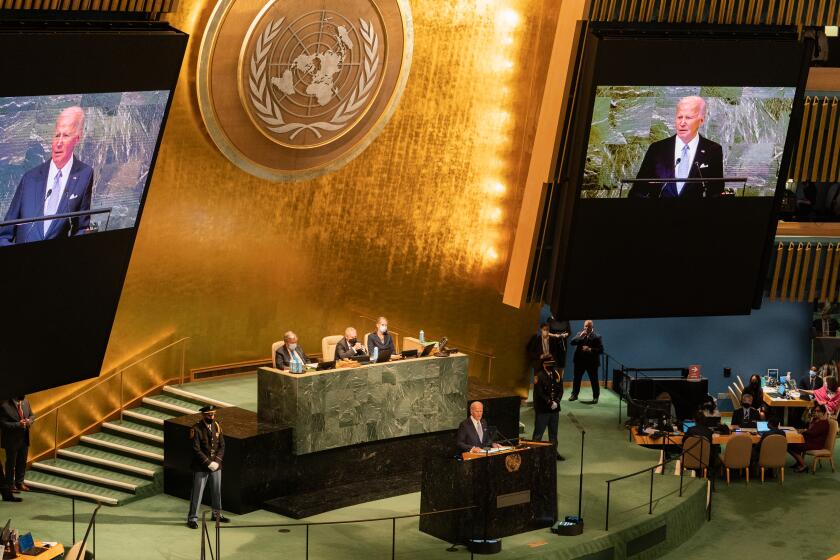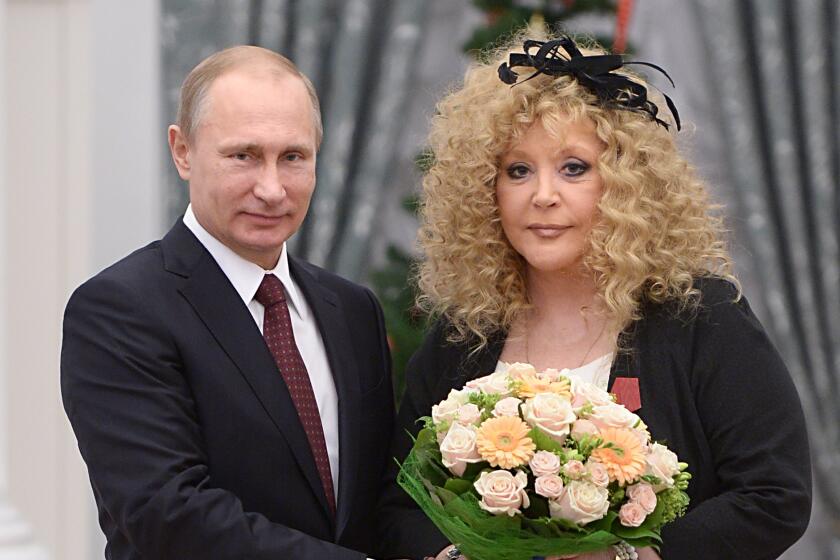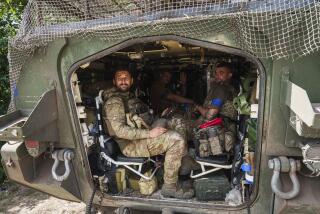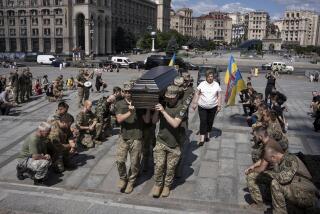No letup in fighting in Ukraine despite prisoner swap
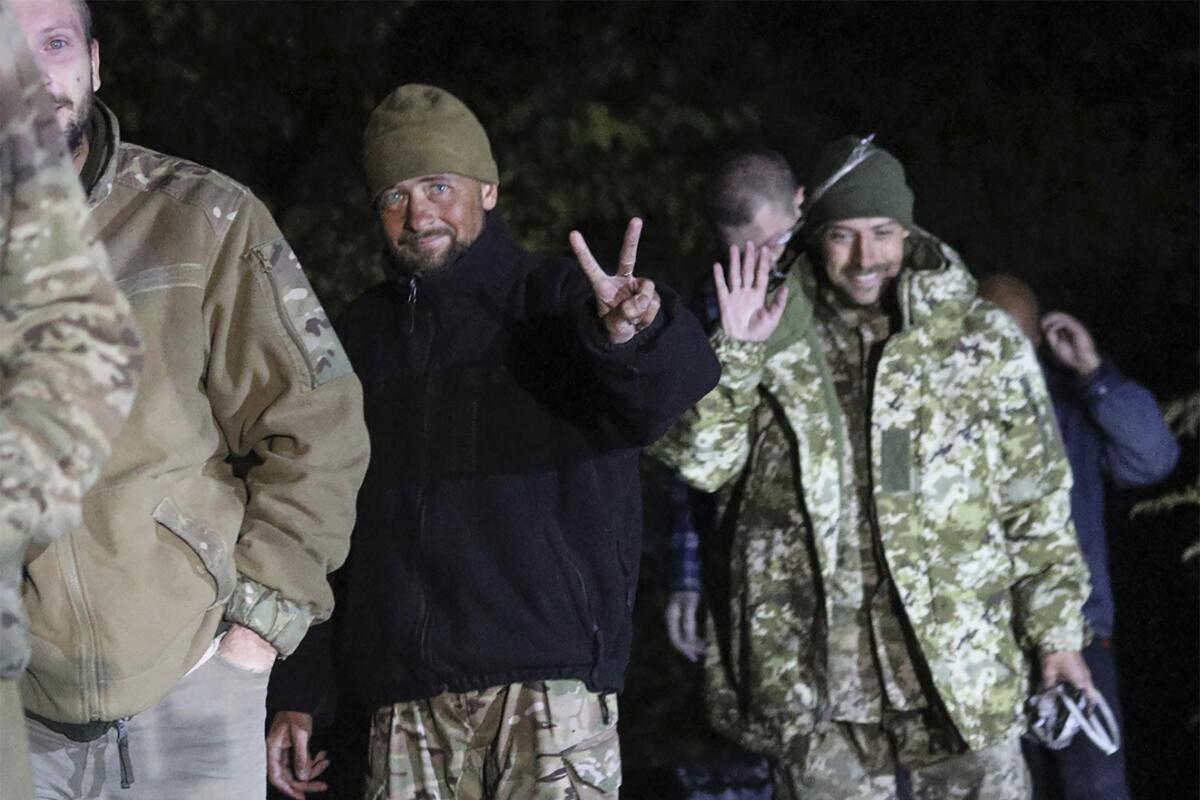
- Share via
KYIV, Ukraine — Russian and Ukrainian forces exchanged missile and artillery barrages that killed at least six people Thursday as both sides refused to concede any ground despite recent military setbacks for Moscow and the toll on Ukraine after almost seven months of war.
Russian missile strikes in the southern city of Zaporizhzhia left one person dead and five others wounded, Ukrainian officials said. Officials in the separatist-controlled city of Donetsk said Ukrainian shelling killed at least six people.
Demonstrating that neither side was ready to ease up or pause the fighting, the exchange of fire came hours after the two sides made a major prisoner swap and the day after Russian President Vladimir Putin called up reserve troops to supplement his forces.
Kyrylo Tymoshenko, the deputy of the Ukrainian president’s office, said that a hotel in the central part of the Zaporizhzhia was struck and that rescuers were on the scene trying to free people trapped in the rubble.
Zaporizhzhia Gov. Oleksandr Starukh said Russian forces targeted infrastructure facilities and also damaged nearby apartment buildings. The Zaporizhzhia region is one of four in which Russia is planning to hold referendums starting Friday on becoming part of Russia, but the city itself is in Ukrainian hands.
Meanwhile, the mayor of the separatist-controlled city of Donetsk, Alexei Kulemzin, said at least five people were killed when Ukrainian shelling Thursday hit a covered market and a passenger minibus. Overnight, one person was killed during Russian shelling in Nikopol city, across the river from the Zaporizhzhia nuclear power plant, according to the Dnipropetrovsk regional governor.
President Biden excoriates Russian President Vladimir Putin and calls for the rest of the world to stand together against the invasion of Ukraine.
Just hours before Thursday’s attacks, a high-profile prisoner swap saw 215 Ukrainian and foreign fighters exchanged — 200 of them for a single person, an ally of Russian President Vladimir Putin. Denis Pushilin, head of the self-proclaimed Donetsk People’s Republic, confirmed that the Putin ally, pro-Russia Ukrainian opposition leader Viktor Medvedchuk, was part of the swap.
Among the freed fighters were Ukrainian defenders of a steel plant in Mariupol during the long Russian siege of the southern port city and 10 foreigners, including five British nationals and two U.S. military veterans, who had fought with Ukrainian forces.
A video on the BBC news website Thursday showed two of the released British men, Aiden Aslin and Shaun Pinner, speaking inside a plane. The video said they had arrived in Riyadh, Saudi Arabia.
“We just want to let everyone know that we’re now out of the danger zone and we’re on our way home to our families,” Aslin said in the video, as Pinner added: “By the skin of our teeth.”
At the risk of being branded a traitor, pop singer Alla Pugacheva has become the most prominent Russian celebrity to question the war in Ukraine.
The speed with which the Russian missile attack came after the swap suggested that the Kremlin was seeking to dispel any notion of weakness or waning determination to achieve its war aims following recent battlefield losses that gravely undercut the aura of Russian military might.
Those losses appeared to spur Putin’s order Wednesday for a partial mobilization of reservists to bolster his forces in Ukraine, a move that sparked rare street protests in Russia and was derided in the West as an act of weakness and desperation. More than 1,300 Russians were arrested in the anti-war demonstrations, according to the independent Russian human rights group OVD-Info.
The order for the partial call-up was short on details, raising concerns of a wider draft that sent some Russians scrambling to buy plane tickets to flee the country. One Russian man who arrived with his 17-year-old son at the airport in Yerevan, Armenia’s capital, said he had made plans for just such a scenario.
Kremlin spokesman Dmitry Peskov said the mobilization was needed because Russia was “de facto facing all of NATO,” a reference to the military aid and other support that the Western alliance’s members have provided to Ukraine.
Breaking News
Get breaking news, investigations, analysis and more signature journalism from the Los Angeles Times in your inbox.
You may occasionally receive promotional content from the Los Angeles Times.
Speaking in New York on Thursday, German Foreign Minister Annalena Baerbock praised Russian antiwar protesters and said no one inside the country could continue to ignore the war in Ukraine because “every Russian is now going to be at risk of being drafted.”
German Interior Minister Nancy Faeser went further, offering concrete support to deserters. She told the Frankfurter Allgemeine Sonntagszeitung that anyone who “courageously opposes Putin’s regime and therefore puts himself in the greatest danger” can apply for asylum in Germany.
Ratcheting up tensions, a senior Kremlin official Thursday repeated Putin’s threat to use nuclear weapons if Russian territory comes under attack.
Dmitry Medvedev, deputy head of Russia’s Security Council, said on his messaging app channel Thursday that strategic nuclear weapons were one of the options to safeguard Russian-controlled territories in eastern and southern Ukraine. The remark appeared to serve as a warning that Moscow could also target Ukraine’s Western allies.
President Volodymyr Zelensky says Ukrainian authorities have found a mass burial site near a recaptured northeastern city previously occupied by Russian forces.
Pro-Moscow authorities in Russian-occupied regions are preparing to hold referendums on becoming part of Russia — a move that could allow Moscow to escalate the war on the grounds of defending Russian soil. The votes start Friday in the Luhansk, Kherson and partly Russian-controlled Zaporizhzhia and Donetsk regions.
Foreign leaders are already calling the votes illegitimate and nonbinding. Ukrainian President Volodomyr Zelensky said they were a “sham” and “noise” to distract the public.
Russia’s neighbors have been on edge about a possible military threat from Moscow, and one of them, Estonia, announced the start of an exercise Thursday for nearly 2,900 reservists and volunteers, in an apparent counter to Moscow’s order of a partial military mobilization.
More to Read
Sign up for Essential California
The most important California stories and recommendations in your inbox every morning.
You may occasionally receive promotional content from the Los Angeles Times.
